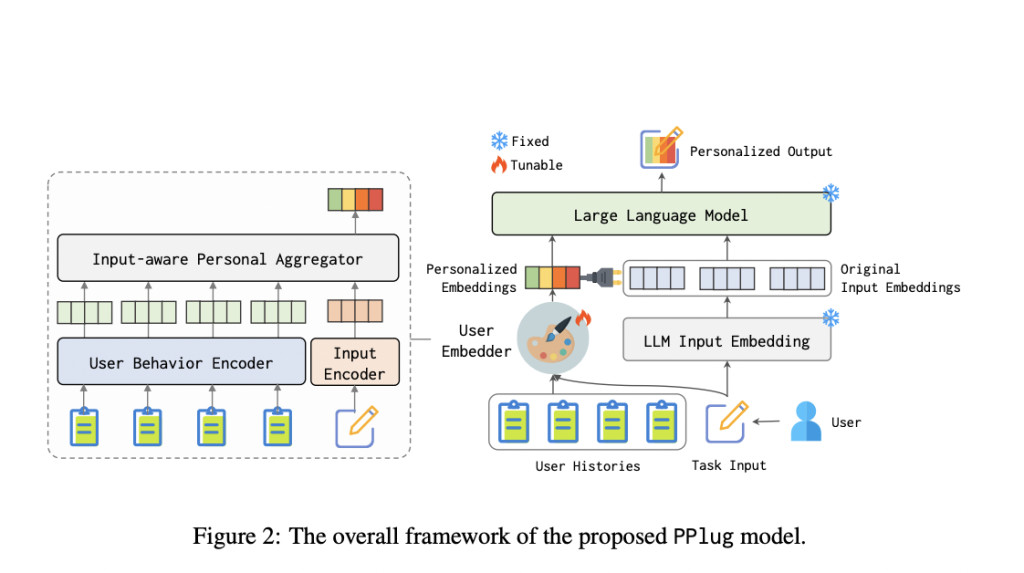Personalization is essential in many language tasks, as users with similar needs may prefer different outputs based on personal preferences. Traditional methods involve fine-tuning language models for each user, which is resource-intensive. A more practical approach uses retrieval-based systems to customize outputs by referencing a user’s previous texts. However, this method may fail to capture a user’s overall style and can disrupt continuity in personalized outputs. A better solution integrates the user’s holistic style into language models without modifying their structure, enabling personalized results without extensive retraining or computational resources.
Researchers from Renmin University of China and Baidu Inc. introduced a new personalized language model, PPlug. It enhances personalization using a plug-in user embedder module that creates a user-specific embedding based on all their historical interactions. This embedding is attached to the input for the language model to reference, allowing it to generate personalized outputs without modifying its parameters. Extensive tests on the LaMP benchmark show that PPlug significantly outperforms existing approaches, achieving improvements of 1.4% to 35.8%. The model efficiently captures users’ holistic behavior patterns for enhanced personalized language generation.
Recent advances in LLMs have led to personalized approaches to cater to individual user preferences. These methods mainly fall into two categories: fine-tuned and retrieval-based personalized LLMs. Fine-tuned models, such as OPPU, adjust parameters for each user but are computationally expensive. To address this, parameter-efficient fine-tuning (PEFT) methods, like LoRA, are employed to optimize efficiency. In contrast, retrieval-based methods leverage user history by retrieving relevant documents to guide LLM outputs without modifying the model. However, these models face limitations with long user histories due to input length restrictions.
The PPlug model personalizes LLMs by incorporating user-specific embeddings derived from historical behaviors, guiding fixed LLMs in generating tailored outputs. The model employs a user behavior encoder to convert each user interaction into vectors, which are then aggregated based on relevance to current inputs through an attention mechanism. Unlike fine-tuned models, PPlug operates as a plug-and-play system, reducing computational costs and avoiding parameter tuning for each user. PPlug evaluates all user behaviors compared to retrieval-based models, providing a comprehensive representation of user preferences for more accurate personalization.
The researchers evaluated their PPlug model using the public LaMP benchmark, including six personalization tasks: citation identification, movie tagging, product rating, news headline generation, scholarly title creation, and tweet paraphrasing. They measured performance with metrics like accuracy, F1-score, MAE, RMSE, and ROUGE scores. Using FlanT5-XXL and BGE-base encoders, PPlug consistently outperformed baseline methods, including non-personalized and retrieval-based models, achieving improvements between 1.4% and 35.8%. Ablation studies showed that incorporating all user histories and instruction embeddings enhances performance. Additionally, combining PPlug with retrieval strategies further boosted results, demonstrating its effectiveness in capturing comprehensive user preferences.
In conclusion, PPlug uses a lightweight, plug-and-play user embedder module to encode and aggregate a user’s historical behaviors into a unique personal embedding, which guides LLMs to generate customized outputs. Unlike existing retrieval-based methods, which may fail to capture a user’s overall linguistic patterns, PPlug creates a single, input-aware embedding to represent a user’s general style. Experiments on the LaMP benchmark show that PPlug significantly outperforms current personalization methods, achieving more personalized outputs without requiring extensive model fine-tuning.
Check out the Paper. All credit for this research goes to the researchers of this project. Also, don’t forget to follow us on Twitter and join our Telegram Channel and LinkedIn Group. If you like our work, you will love our newsletter..
Don’t Forget to join our 50k+ ML SubReddit
The post Persona-Plug (PPlug): A Lightweight Plug-and-Play Model for Personalized Language Generation appeared first on MarkTechPost.
Source: Read MoreÂ

